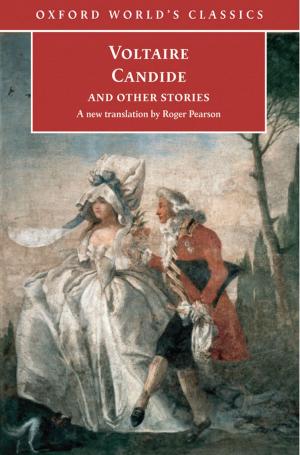The Prince
Nonfiction, Social & Cultural Studies, Political Science, Politics, History & Theory, History| Author: | Niccol� Machiavelli, Maurizio Viroli | ISBN: | 9780191604584 |
| Publisher: | Oxford University Press, UK | Publication: | February 10, 2005 |
| Imprint: | OUP Oxford | Language: | English |
| Author: | Niccol� Machiavelli, Maurizio Viroli |
| ISBN: | 9780191604584 |
| Publisher: | Oxford University Press, UK |
| Publication: | February 10, 2005 |
| Imprint: | OUP Oxford |
| Language: | English |
Based upon Machiavelli's first-hand experience as an emissary of the Florentine Republic to the courts of Europe, The Prince analyses the usually violent means by which men seize, retain, and lose political power. This fluent new translation is accompanied by comprehensive notes and an introduction that dispels some of the myths associated with Machiavelli, and considers the true purpose of The Prince. - ;'A prince must not have any other object nor any other thought...but war, its institutions, and its discipline; because that is the only art befitting one who commands.' When Machiavelli's brief treatise on Renaissance statecraft and princely power was posthumously published in 1532, it generated a debate that has raged unabated until the present day. Based upon Machiavelli's first-hand experience as an emissary of the Florentine Republic to the courts of Europe, The Prince analyses the usually violent means by which men seize, retain, and lose political power. Machiavelli added a dimension of incisive realism to one of the major philosophical and political issues of his time, especially the relationship between public deeds and private morality. His book provides a remarkably uncompromising picture of the true nature of power, no matter in what era or by whom it is exercised. This fluent new translation is accompanied by comprehensive notes and an introduction that considers the true purpose of The Prince and dispels some of the myths associated with it. - ;Literary scholar Peter Bondanella rightly seeks the cold elegance and readability of the original. Serious English readers will want both translations. - Lauro Martines, TLS
Based upon Machiavelli's first-hand experience as an emissary of the Florentine Republic to the courts of Europe, The Prince analyses the usually violent means by which men seize, retain, and lose political power. This fluent new translation is accompanied by comprehensive notes and an introduction that dispels some of the myths associated with Machiavelli, and considers the true purpose of The Prince. - ;'A prince must not have any other object nor any other thought...but war, its institutions, and its discipline; because that is the only art befitting one who commands.' When Machiavelli's brief treatise on Renaissance statecraft and princely power was posthumously published in 1532, it generated a debate that has raged unabated until the present day. Based upon Machiavelli's first-hand experience as an emissary of the Florentine Republic to the courts of Europe, The Prince analyses the usually violent means by which men seize, retain, and lose political power. Machiavelli added a dimension of incisive realism to one of the major philosophical and political issues of his time, especially the relationship between public deeds and private morality. His book provides a remarkably uncompromising picture of the true nature of power, no matter in what era or by whom it is exercised. This fluent new translation is accompanied by comprehensive notes and an introduction that considers the true purpose of The Prince and dispels some of the myths associated with it. - ;Literary scholar Peter Bondanella rightly seeks the cold elegance and readability of the original. Serious English readers will want both translations. - Lauro Martines, TLS















